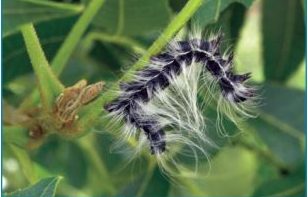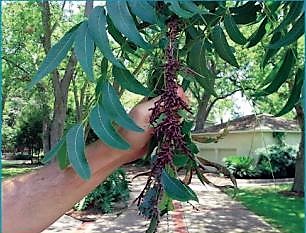By Mario Villarino, Texas A&M AgriLife Extension

Recently, many pecan trees have shown infestations of fuzzy caterpillars. These caterpillars are growing in hundreds and are easy to find. Basically if your trees are having an infestation now you will notice. Unlike early season caterpillars that feed on new growth, walnut caterpillar larvae prefer mature foliage. Consequently, infestations will not appear until late spring or after foliage has matured. Trees or branches that were defoliated will initiate new growth, which should not be damaged by the next generation.
To help prevent significant defoliation, homeowners and commercial operators should know the following symptoms. Early detection is important so control measures can be applied before significant damage occurs.
During most years, natural predators and parasites keep walnut caterpillar populations in check. Several species of wasps and flies consume egg masses and larvae, and many other insects and spiders prey upon larvae.
On small trees, homeowners can achieve some control by removing egg masses from leaves and larvae from the branches.
For large trees or for large acreage, an insecticide application is the most practical way to prevent damage. Insecticides that are recommended for homeowners will contain spinosad or Bacillus thuringiensis as their active ingredient. These insecticides are selective for caterpillars (Lepidoptera larvae) and very safe to humans.

To increase the effectiveness of insecticides, apply them when the larvae are small and ensure that the spray covers the entire canopy. Broad-spectrum insecticides can be effective but carry some risk for the applicator and may cause secondary insect outbreaks.
Insecticide labeling is subject to change, so always consult the label for target sites and pests, application rates, and safety precautions. The user is responsible for the effects on his or her plants, as well as problems caused by drift onto adjacent properties.
For more information on this or any other agricultural topic please contact the Hopkins County Extension Office at 903-885-3443 or email me at [email protected].







